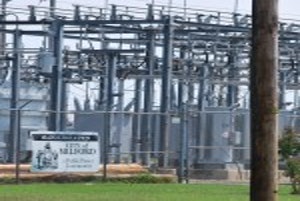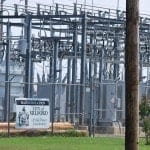
City of Milford’s current electric substation on Elks Lodge Road.
Over the winter, after the state of Texas dealt with significant power outages due to winter weather, Councilman Brian Baer asked City Manager Mark Whitfield if council could hear what protections Milford has in place to prevent such a disaster from happening. On Mon., May 10, Kimberly Schlicting, COO of Delaware Municipal Electric Corporation (DEMEC) provided City Council with details on what the organization does to keep the power grid running, even during serious weather.
“First, let’s talk about what happened in Texas,” Schlicting said. “It was the perfect storm for them as you read or had family and friends who lived there tell you. They were hit by extremely cold temperatures in what has been called a “generational storm.” It wasn’t just renewables. They had natural gas issues, the freezing of equipment. Texas, a southern state, is not prepared for the cold temperatures they experienced. The weatherization and requirements there are not the same as what we have here. However, in 2011, they had a storm and ERCOT was directed to make some improvements. They did not heed those directions and, as a result, it happened again. The fact is that no electric utility can claim 100 percent reliability, but the leadership here works toward that target.”
Schlicting explained that not only did wind turbines freeze as they were not deiced properly, but the extended gray skies during the storm led to less output from their solar farms and that many generators that run on natural gas were inoperable as the availability of natural gas was not able to meet demand. In addition, Texas is what is known as an “island grid,” which means they are not interconnected to grids in other states. DEMEC uses a PJM interconnection which is a regional grid. This interconnects Delaware with 12 other states and the District of Columbia, providing access to a greater number of generation assets for added reliability and stability.
“DEMEC also works to be sure there are no variable rates for wholesale to members,” Schlicting said. “We can provide stable fixed electric rates that do not fluctuate on a monthly basis. WE also maintain a rate stabilization reserve fund to cover those rainy-day events that could happen that might lead to higher costs. We do not have third-party electric suppliers in our service territory. We have seen this kind of thing happen, though, in fact, it happened to DP&L. I am sure you saw on the news what happened in Texas with the $1800 electric rate. Those costs were related to the use of third-party electric suppliers.”
Schlicting also explained that DEMEC’s power supply comes from a diverse mix of resources, including natural gas, solar, wind, fuel cell and energy efficiency. All generation assets are winterized to prevent freezing, including the use of space heaters, heat tracing, fuel oil heaters and more. DEMEC also utilizes hedging practices such as capacity ownership, fixed-cost gas fuel, financial transmission rights and fixed-cost, future power contracts, all of which can protect rates.
“When it comes to the city itself, there are things we ask of them to protect the power grid,” Schlicting said. “Prudent tree trimming minimizes downed power lines due to tree damage and regular inspection of the grid can identify potential issues before they cause an outage. The city performs scheduled maintenance and infrastructure upgrades, replacing equipment before it fails and tests equipment to be sure the substations are operating as expected. The city also collaborates with other municipal utilities.”
Should there be a catastrophic event, DEMEC has a mutual aid agreement with FEMA and other states where each municipality steps in to help when there is a disaster. This occurred after Hurricanes Sandy and Isaias. If a disaster should strike, Milford other municipalities would send assistance similar to what Milford has done for others.
“It is reassuring to know we are an active participant in protecting our electric grid,” Councilman Mike Boyle said. “We see on the news when we send trucks elsewhere, so it is good to know that if we should need that assistance it is there.”
Share this Post


